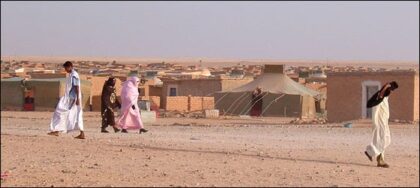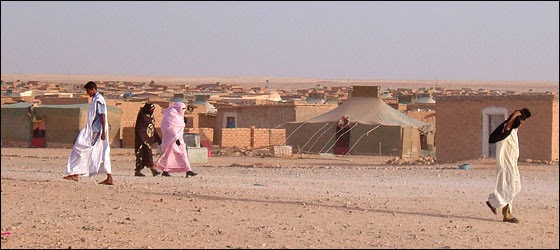 Spanish media has uncovered a new slavery story in Tindouf camps after an 18 year-old girl succeeded in breaking the chains of enslavement by escaping to Barcelona via Algeria.
Spanish media has uncovered a new slavery story in Tindouf camps after an 18 year-old girl succeeded in breaking the chains of enslavement by escaping to Barcelona via Algeria.
The girl who was sold out by her father entered Spanish territory using false passport, triggering the interest of Spanish media.
She explained to the media that she was put by her father between death or accepting an arranged marriage to an old man in return for money that her father will get.
“My father threatened to kill me if I don’t accept to get married,” she told the media in Barcelona where many activists offered her help.
Slavery, an institutionalized practice
Human auctions in Tindouf are an institutionalized practice that is a relic of an archaic tribal system. In these camps, slave masters hold documents attesting to their “ownership” of other human beings, mostly blacks.
In 2009, two Australian journalists with the Sydney Morning Herald were invited to the camps by the Polisario representative in Australia with the aim to carry out a propaganda coverage in favor of the Polisario leadership. While in the camps, the two journalists noticed slavery practices and decided to secretly film a documentary on the ordeal of black people in the camps.
The film, dubbed “Stolen”, exposes modern-day slavery in the refugee camps of Tindouf through telling the story of a Sahrawi girl called Fatim Sellami, herself a slave, who was reunited with her mother after 35 years of separation with the help of the United Nations.
The film, which also tackles several cases other than Fatim’s, was not initially meant to deal with slavery. Journalists Ayala and Fallshaw wanted to make a documentary on the living conditions in the Tindouf camps, but when they arrived there, they found out about the slave trade and decided to shift focus.
The film shows that those Sahrawi girls offered for sale are persecuted and are frequently beaten. Their names are also changed and they are not allowed to marry except with the permission of their masters who have to provide them with a document stating that they have been granted freedom.
In its annual reports on the human rights conditions in the Tindouf camps, Human Rights Watch (HRW) has condemned the persistence of slavery practices.
“Practices of slavery that centuries ago were a basic feature of traditional nomadic culture in the Western Sahara appear all but nonexistent among the Sahrawi refugees today,” HRW said in its report on Tindouf camps.
“The persistence of certain forms of slavery highlights the need for continuous, on-the-ground human rights monitoring,” it said.



